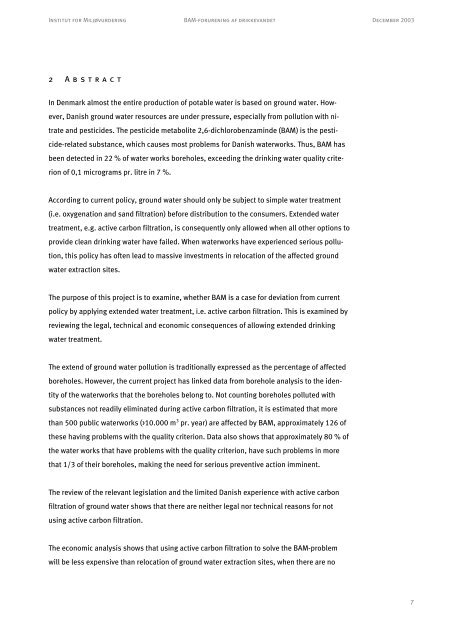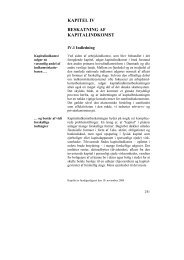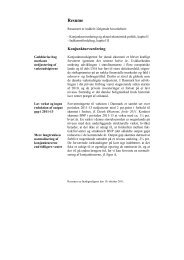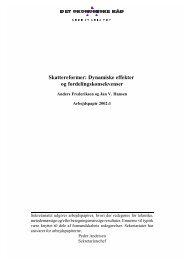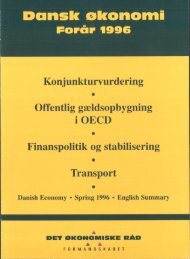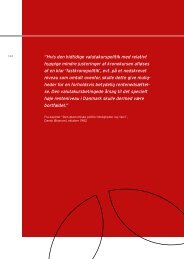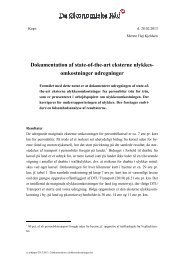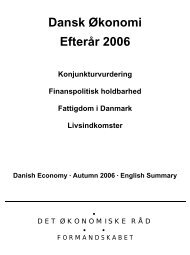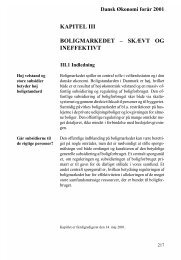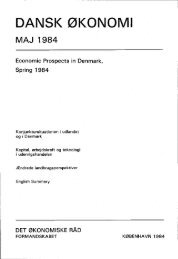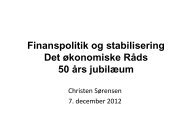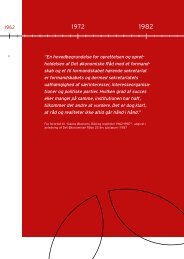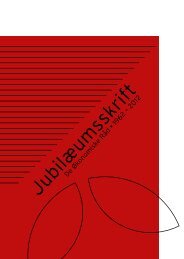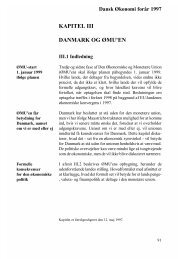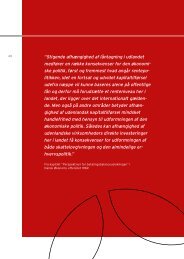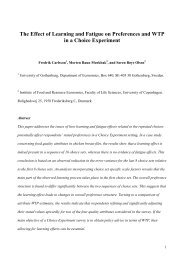BAM-forurening af drikkevandet - Skal vi rense? - De Økonomiske Råd
BAM-forurening af drikkevandet - Skal vi rense? - De Økonomiske Råd
BAM-forurening af drikkevandet - Skal vi rense? - De Økonomiske Råd
You also want an ePaper? Increase the reach of your titles
YUMPU automatically turns print PDFs into web optimized ePapers that Google loves.
Institut for Miljøvurdering <strong>BAM</strong>-<strong>forurening</strong> <strong>af</strong> <strong>drikkevandet</strong> <strong>De</strong>cember 2003<br />
2 Abstract<br />
In <strong>De</strong>nmark almost the entire production of potable water is based on ground water. How-<br />
ever, Danish ground water resources are under pressure, especially from pollution with ni-<br />
trate and pesticides. The pesticide metabolite 2,6-dichlorobenzaminde (<strong>BAM</strong>) is the pesti-<br />
cide-related substance, which causes most problems for Danish waterworks. Thus, <strong>BAM</strong> has<br />
been detected in 22 % of water works boreholes, exceeding the drinking water quality crite-<br />
rion of 0,1 micrograms pr. litre in 7 %.<br />
According to current policy, ground water should only be subject to simple water treatment<br />
(i.e. oxygenation and sand filtration) before distribution to the consumers. Extended water<br />
treatment, e.g. active carbon filtration, is consequently only allowed when all other options to<br />
pro<strong>vi</strong>de clean drinking water have failed. When waterworks have experienced serious pollu-<br />
tion, this policy has often lead to massive investments in relocation of the <strong>af</strong>fected ground<br />
water extraction sites.<br />
The purpose of this project is to examine, whether <strong>BAM</strong> is a case for de<strong>vi</strong>ation from current<br />
policy by applying extended water treatment, i.e. active carbon filtration. This is examined by<br />
re<strong>vi</strong>ewing the legal, technical and economic consequences of allowing extended drinking<br />
water treatment.<br />
The extend of ground water pollution is traditionally expressed as the percentage of <strong>af</strong>fected<br />
boreholes. However, the current project has linked data from borehole analysis to the iden-<br />
tity of the waterworks that the boreholes belong to. Not counting boreholes polluted with<br />
substances not readily eliminated during active carbon filtration, it is estimated that more<br />
than 500 public waterworks (>10.000 m 3 pr. year) are <strong>af</strong>fected by <strong>BAM</strong>, approximately 126 of<br />
these ha<strong>vi</strong>ng problems with the quality criterion. Data also shows that approximately 80 % of<br />
the water works that have problems with the quality criterion, have such problems in more<br />
that 1/3 of their boreholes, making the need for serious preventive action imminent.<br />
The re<strong>vi</strong>ew of the relevant legislation and the limited Danish experience with active carbon<br />
filtration of ground water shows that there are neither legal nor technical reasons for not<br />
using active carbon filtration.<br />
The economic analysis shows that using active carbon filtration to solve the <strong>BAM</strong>-problem<br />
will be less expensive than relocation of ground water extraction sites, when there are no<br />
7


